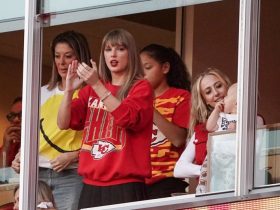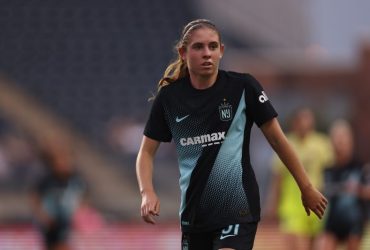Karl-Anthony Towns is not wrong; the Minnesota Timberwolves have lost a lot before all this happened.
Before the T-Wolves ripped off a historic run on the road Sunday night in Game 7 of the Western Conference Semifinals to unseat the defending champion Denver Nuggets, the Timberwolves were, by and large, a middling franchise that struggled to seriously compete for NBA titles.
As Towns pointed out in a comical exchange with a reporter, it has been a long time coming.
Reporter: ‘Usually in NBA history it says you have to lose, and lose big, before you win. What is it about this team that says …’
Towns: ‘We lost last year.’
Reporter: ‘Yeah but that’s different, you have to lose at a bigger stage, usually.’
Towns: ‘It’s the playoffs, we lost last year.’
Anthony Edwards: ‘We lost the last two years, (expletive).’
Towns: ‘(Expletive). How much more we got to lose?’
Edwards: ‘Yeah, how much you want us to lose?’
Towns: ‘We’ve been losing for 20 years, (expletive).’
The laughter from that viral moment aside, the previous history Towns alluded to deserves a closer look just to contextualize how sharp Minnesota’s climb has been.
All things T-Wolves: Latest Minnesota Timberwolves news, schedule, roster, stats, injury updates and more.
Timberwolves’ turnaround
The Timberwolves this season posted a record of 56-26, which was two wins off of the franchise’s all-time best of 58 back in the 2003-04 season when Minnesota lost in the conference finals to the Kobe Bryant and Shaquille O’Neal-led Los Angeles Lakers.
Minnesota’s turnaround this season marked a 14-win increase from last year (42-40) and was still 10 victories better than the team’s mark the season previous (46-36). While the Timberwolves did make the postseason in each of the previous two seasons, they were quickly bounced each time in the first round.
Just five seasons ago, Minnesota posted just 19 victories.
‘I’ve been here nine years,’ Towns said later in his postgame news conference. ‘I’ve talked about wanting to win and do something special here in this organization. For all the failures and all the things that didn’t materialize, that happened, the disappointment that comes with it, to have this moment where, even this moment to celebrate the wins.
‘For me, being nine years, I’ve seen everything and seen it all … to being here, this year, these guys, this team, after all that, it’s super special.’
How Timberwolves got here
There are a couple of factors. Head coach Chris Finch is one of them. He has led the franchise for three full seasons and the Timberwolves have made the playoffs each of those seasons; Finch was hired midway through the 2020-21 season, after the Wolves had posted a 7-24 record, the worst in the NBA at the time.
In his full seasons as Minnesota’s coach, the team has posted a 144-102 (.585) record. Before Finch took over, the Timberwolves had made the playoffs only once (2017-18) in the previous 17 seasons. But Finch is just one part of the equation.
Towns was Minnesota’s No. 1 overall selection in the 2015 NBA Draft, and he instantly provided height and versatility as a play-making scorer. He’s comfortable posting up in the low block as much as he is shooting from the perimeter. Still, while there was some talent on the Timberwolves teams early in Towns’ tenure there, the rosters were built imperfectly, with significant holes.
When coach Tom Thibodeau took over and when the team acquired Jimmy Butler in a trade from the Chicago Bulls, the Timberwolves had a brief spell of success, making the playoffs in 2017-18, though they lost in the first round. Butler flamed out in Minnesota and was traded to the Philadelphia 76ers and Thibodeau was eventually fired, ushering in yet another rebuild.
It took for another No. 1 overall pick to fall Minnesota’s way for the franchise’s history to change. That pick, in the 2020 NBA Draft, became guard Anthony Edwards, who has since emerged as one of the premier guards in the league, one who has drawn comparisons to Michael Jordan. But there was another, under-the-radar move that year that also had a massive impact.
The Lakers selected forward Jaden McDaniels with the 28th pick in the 2020 draft, but L.A. traded his rights to Minnesota (via the Oklahoma City Thunder) in a deal that also brought point guard Ricky Rubio to the Timberwolves. McDaniels has since become one of Minnesota’s long, athletic wing defenders – often paired alongside Nickeil Alexander-Walker in defensive rotations –to shut down opposing guards and forwards.
By the time Edwards was playing his rookie season in 2020-21, it was the second season for an undrafted center who spent his first season in the G League. That player was Naz Reid, who this season became the first player in Timberwolves history to win the NBA’s Sixth Man of the Year award.
Finally, the last significant piece for the Timberwolves came in the form of Tim Connelly, the former Nuggets executive who is credited with building Denver into its championship-contending form. The Timberwolves hired Connelly in May 2022 as president of basketball operations.
Connelly’s two biggest moves are both significant trades. The first shipped guard D’Angelo Russell to the Lakers in a three-team trade and brought back a return of point guard Mike Conley (now starting for the Timberwolves) and Alexander-Walker. The other was a blockbuster with the Utah Jazz to acquire center Rudy Gobert, who has remained a dominant rim protector and who won the NBA Defensive Player of the Year award this season, for a record-tying fourth time.
At the time, Connelly and the Timberwolves faced some criticism for the Gobert trade, both for the haul the team had to ship to acquire him, and for the unconventional pairing of Gobert – a 7-foot-1 player – with Towns, who is 7-foot. Yet it is precisely that height and defensive versatility that has given Minnesota an edge over its opponents, causing the Nuggets fits throughout their series.
The Timberwolves will face the Dallas Mavericks in the Western Conference Finals, with Game 1 scheduled for Wednesday at 8:30 p.m. ET.




